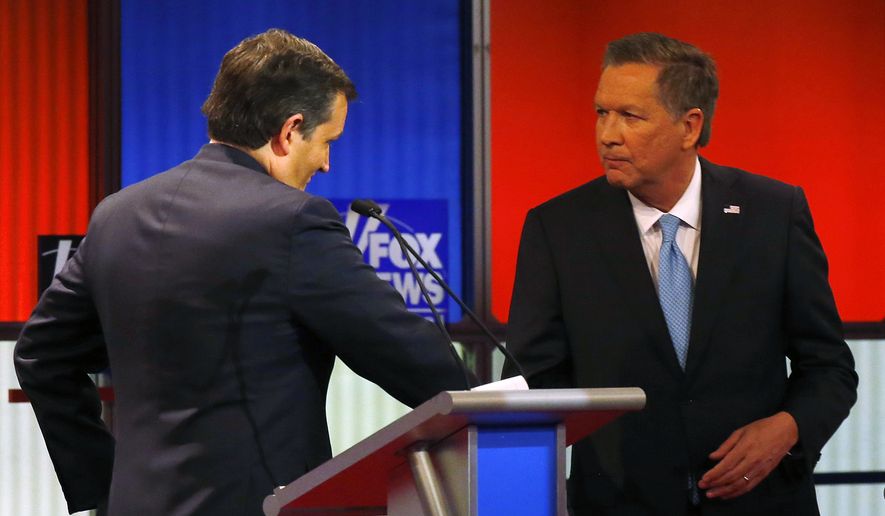The uncomfortable alliance forged by Republican presidential hopefuls Sen. Ted Cruz of Texas and Ohio Gov. John Kasich began to falter almost as soon as it was announced, with the candidates squabbling Monday over what it meant, and front-runner Donald Trump saying their “collusion” proved the system is rigged and underscores the weakness of his rivals.
The agreement between Mr. Cruz and Mr. Kasich to divvy up battleground states beginning with the May 3 primary in Indiana signaled that they had all but ceded to Mr. Trump the five Northeast states voting Tuesday.
What’s more, the last-ditch scheming highlighted the heightened desperation of the #NeverTrump movement in its bid to force a contested July convention in Cleveland, where they hope to steer the nomination away from Mr. Trump.
Under the agreement, Mr. Kasich stopped campaigning in Indiana and Mr. Cruz stopped campaigning in Oregon and New Mexico, which vote May 17 and June 7, respectively.
Mr. Cruz heralded the “big news” that Mr. Kasich had decided not to compete in Indiana. But Mr. Kasich called the agreement “no big deal” because it was merely a way to conserve his limited resources.
Both candidates refused to tell their voters to switch sides to benefit the other.
“I’ve never told them not to vote for me. They ought to vote for me,” Mr. Kasich told reporters at a campaign stop at a diner in Philadelphia.
SEE ALSO: Donald Trump: Ted Cruz-John Kasich deal ‘pathetic,’ ‘makes them both look weak’
Doubts persisted about how much of a boost Mr. Cruz would get in Indiana. He trailed Mr. Trump 40 percent to 35 percent, with Mr. Kasich at 20 percent, according to a CBS News/YouGov poll.
“I don’t think it is going to make a huge impact here just because Kasich’s campaign hasn’t gotten off the ground much in the state,” said Edward G. Carmines, director of the Center on American Politics at Indiana University. “It really does indicate the desperation that the anti-Trump forces are facing.”
The scheme also played into Mr. Trump’s narrative that the Republican Party is rigging the system against him — a message that has energized his supporters.
He labeled the Cruz-Kasich deal “collusion.”
“If you collude in business or if you collude in the stock market, they put you in jail. But in politics — because it is a rigged system, because it is a corrupt enterprise — in politics you are allowed to collude. So they colluded,” Mr. Trump said at a rally in Rhode Island, which votes Tuesday along with Maryland, Delaware, Connecticut and Pennsylvania.
“Actually, I was happy because it showed how weak they are. It showed how pathetic they are,” he said.
Mr. Trump’s fans echoed that sentiment.
“Trump wins. He is a winner,” said Gabriel Keller, who is running for delegate in Pennsylvania. “They are losers and they are struggling, and they have to join forces to be losers together.”
Mr. Cruz and Mr. Kasich shrugged off the allegation of “collusion.”
“Donald Trump is going to scream and yell and curse and insult, and probably cry and whine some as well. That has been Donald’s pattern,” Mr. Cruz said when asked about the charge.
“What does that even mean?” Mr. Kasich asked.
Still, the deal sent a clear signal to the candidates’ political action committees to stop the negative ads against each other in Indiana, Oregon and New Mexico, which could help them solidify support among anti-Trump voters.
Indeed, the pro-Cruz Trusted Leadership PAC announced that it would keep running attack ads against Mr. Kasich in Indiana but pull the ads in the other two states in the deal.
Kellyanne Conway, spokeswoman for the political action committee, said TV ads hammering Mr. Kasich for expanding Medicare under Obamacare in Ohio would stay on the air in Indiana “as we attempt to win every possible vote for Senator Cruz.”
The plan was hatched by Mr. Cruz, who is Mr. Trump’s chief rival and needs to win in Indiana to have a shot at stopping the billionaire businessman from securing the 1,237 delegates needed to clinch the nomination before Cleveland.
Neither Mr. Cruz nor Mr. Kasich have a path to win the nomination outright. A contested convention has become the only rationale for their campaigns.
“Indiana is a crossroads. It is a crossroads for the entire country,” Mr. Cruz said while campaigning in the Hoosier State.
Mr. Trump leads the delegate race with 845, followed by Mr. Cruz with 559 and Mr. Kasich with 148, according to a tally by The Associated Press.
Another 172 delegates are up for grabs in contests Mr. Trump is expected to sweep Tuesday in Connecticut, Delaware, Maryland, Pennsylvania and Rhode Island.
The deal marked a dramatic strategic shift for Mr. Kasich and Mr. Cruz.
Just last week Team Kasich rolled out its Indiana leadership team and announced it had opened a few campaign offices in the state.
Craig Dunn, a member of Mr. Kasich’s steering committee in Indiana and a delegate to the Republican National Convention, said Indiana voters are independent-minded, so it is hard to predict whether they will shift their allegiance behind Mr. Cruz.
He even admitted that he is mulling what he will do at the ballot box, adding that the deal left a “little bitter taste.”
“Frankly, I would not be much more excited about voting for Ted Cruz than Donald Trump,” he said. “I might very well vote for John Kasich on May 3.”
⦁ David Sherfinski contributed to this report.
• Seth McLaughlin can be reached at smclaughlin@washingtontimes.com.
• S.A. Miller can be reached at smiller@washingtontimes.com.




Please read our comment policy before commenting.